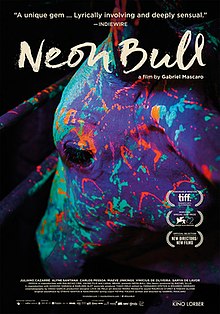
Rodeo is a competitive equestrian sport that arose out of the working practices of cattle herding in Spain and Mexico, expanding throughout the Americas and to other nations. It was originally based on the skills required of the working vaqueros and later, cowboys, in what today is the western United States, western Canada, and northern Mexico. Today, it is a sporting event that involves horses and other livestock, designed to test the skill and speed of the cowboys and cowgirls. American-style professional rodeos generally comprise the following events: tie-down roping, team roping, steer wrestling, breakaway roping, saddle bronc riding, bareback bronc riding, bull riding and barrel racing. The events are divided into two basic categories: the timed events and the roughstock events. Depending on sanctioning organization and region, other events such as steer roping, goat tying, and pole bending may also be a part of some rodeos. The "world's first public cowboy contest" was held on July 4, 1883, in Pecos, Texas, between cattle driver Trav Windham and roper Morg Livingston.

Bumba Meu Boi is an interactive play celebrated in Brazil. It originated in the 18th century. It is a form of social criticism. Lower-class Brazilians mock and criticize those of higher social status through a comedic folklore story told in song and dance. Though not as well known internationally as Carnival and other Brazilian festivals, it is older and deeply rooted in the culture of Brazil. The tale can vary depending on the region and social setting in which it is practiced. However, its essential theme remains the same, with a focus on the death and resurrection of an ox.
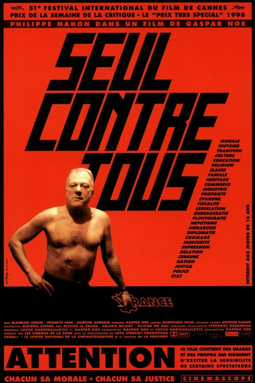
I Stand Alone is a 1998 French psychological drama art film written and directed by Gaspar Noé as his directorial debut, and starring Philippe Nahon, Blandine Lenoir, Frankye Pain, and Martine Audrain. The film, focusing on several pivotal days in the life of a butcher facing abandonment, isolation, rejection and unemployment, was the director's first feature-length production, and is a sequel to his 1991 short film Carne.

Rebels of the Neon God is a 1992 Taiwanese drama film written and directed by Tsai Ming-liang in his feature film directorial debut. It stars Wang Yu-wen, Chen Chao-jung, Lee Kang-sheng, Jen Chang-bin, Miao Tien, and Lu Hsiao-ling.

Time of Fear is a 2009 Brazilian thriller film directed and written by Sérgio Rezende. It depicts the May 2006 riots perpetuated by the Primeiro Comando da Capital (PCC) criminal organization in the state of São Paulo. The Ministry of Culture submitted it for consideration of the Academy of Motion Picture Arts and Sciences for the 82nd Best Foreign Language Film Oscar, but was not nominated. The Film won the Crystal Lens Award for Best Feature Film at the 2nd Brazilian Film Festival of London.

360 is a 2011 drama thriller film directed by Fernando Meirelles and written by Peter Morgan as a loose adaptation of Arthur Schnitzler's 1897 play Reigen. The film stars an ensemble cast of Anthony Hopkins, Ben Foster, Rachel Weisz, Jude Law and other international actors. Following the stories of couples and their sexual encounters, 360 was selected to open the 2011 London Film Festival. Magnolia Pictures released the film on video on demand on 29 June 2012 and was released in United States theaters on 3 August 2012. The film reunited Weisz and director Meirelles, who worked together on The Constant Gardener.

Once Upon a Time Was I, Verônica is a 2012 Brazilian drama film directed and written by Marcelo Gomes. At the 45th Festival de Brasília it shared the Best Film Award with They'll Come Back, and won Best Supporting Actor, Best Screenplay, Best Cinematography and Best Score.

The Way He Looks is a 2014 Brazilian coming-of-age romantic drama film written and directed by Daniel Ribeiro, based on his 2010 short film I Don't Want to Go Back Alone. The film stars Ghilherme Lobo, Fábio Audi, and Tess Amorim, reprising their roles from the short.

Gabriel Mascaro is a Brazilian visual artist and film director.
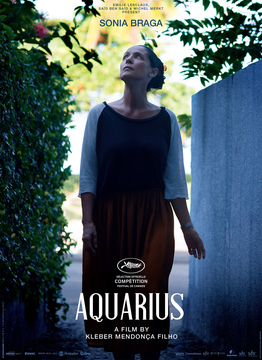
Aquarius is a 2016 drama film written and directed by Kleber Mendonça Filho and starring Sônia Braga as Clara, the last resident of Aquarius building, who refuses to sell her apartment to a construction company that intends to replace it with a new edifice. It was selected to compete for the Palme d'Or at the 2016 Cannes Film Festival.
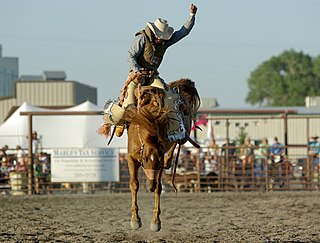
A bucking horse is any breed of horse, male or female, with a propensity to buck. They have been, and still are, referred to by various names, including bronco, broncho, and roughstock.

The Rider is a 2017 American contemporary western film written, produced and directed by Chloé Zhao. The film stars Brady Jandreau, Lilly Jandreau, Tim Jandreau, Lane Scott, and Cat Clifford and was shot in the Badlands of South Dakota. It premiered in the Directors' Fortnight section at the Cannes Film Festival on May 20, 2017, where it won the Art Cinema Award. It was released in theaters in the United States on April 13, 2018. It grossed $4 million and was critically praised for its story, performances, and the depiction of the people and events that influenced the film.

O Outro Lado do Paraíso is a Brazilian telenovela created by Walcyr Carrasco, which premiered on TV Globo on 23 October 2017, replacing A Força do Querer, and ended on 11 May 2018, being replaced by Segundo Sol.
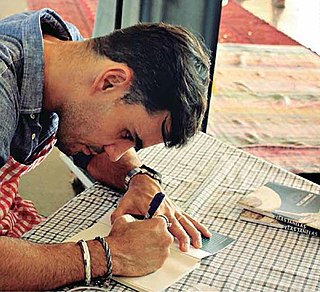
Juliano Cazarré is a Brazilian actor and writer. He appeared in more than thirty films since 2002.

Bacurau is a 2019 Weird Western film written and directed by Kleber Mendonça Filho and Juliano Dornelles. It stars Sônia Braga, Udo Kier, Bárbara Colen, Thomas Aquino, Silvero Pereira, and Karine Teles. The film, a co-production between Brazil and France, revolves around Bacurau, a fictional small town in the Brazilian sertão that is beset by strange happenings following the death of its matriarch, Carmelita, at the age of 94.

A Dona do Pedaço is a Brazilian telenovela produced and broadcast by Globo. It premiered on 20 May 2019, replacing O Sétimo Guardião, and ended on 22 November 2019, replaced by Amor de Mãe. It was written by Walcyr Carrasco, with the collaboration of Márcio Haiduck, Nelson Nadotti and Vinícius Vianna; with the direction of André Barros, Bernardo Sá, Bruno Martins Moraes, Caetano Caruso and Vicente Kubrusly, general direction of Luciano Sabino and artistic direction of Amora Mautner.

Amor de Mãe is a Brazilian telenovela produced and broadcast by TV Globo, from 25 November 2019 to 9 April 2021. The telenovela is written by Manuela Dias, with Mesquita, Roberto Vitorino and Walter Daguerre as co-writers. José Luiz Villamarim serves as director.
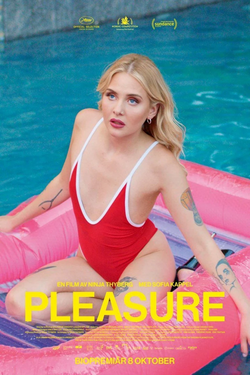
Pleasure is a 2021 drama film written and directed by Ninja Thyberg in her feature directorial debut. The film is based on Thyberg's 2013 short of the same name, and is about a young woman from a small Swedish town who moves to Los Angeles to become a porn star. It stars Sofia Kappel, Revika Anne Reustle, Evelyn Claire, Chris Cock, Dana DeArmond and Kendra Spade.

Canal Brasil is a Brazilian subscription TV channel with programming focused on the country's audiovisual productions.

The 20th Lima Film Festival, organized by the Pontifical Catholic University of Peru, took place from 5 to 13 August 2016 in Lima, Peru. The awards were announced on 13 August 2016, with Dark Beast winning the Trophy Spondylus.
